-

Honey Locust Seed
Gleditsia triacanthos£9.50 inc. VATHoney Locust is an elegant, large deciduous tree with frond like leaves that is also very tolerant of polluted atmospheres. Inconspicuous white/green pea like flowers in summer give rise to impressive long brown twisted seed pods in the autumn, and these have been used as cattle feed, since they are sweet.
-
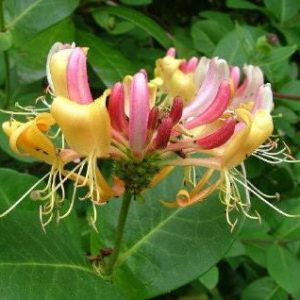
Honeysuckle / Woodbine Seed
Lonicera periclymenum£2.00 – £7.00 inc. VATHoneysuckle is a vigorous medium sized climber. The flowers are up to 5cm long and fragrant, cream inside and purple / yellow on the outside. They flower from early summer through to early autumn and are followed by red berries. Bees love the flowers and birds eat the berries. It is one of the first plants to show leaf in spring, especially in the shelter of woodlands.
-
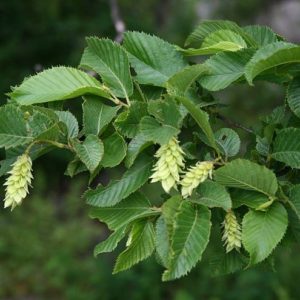
Hop Hornbeam Seed
Ostrya carpinifolia£6.50 inc. VATHop Hornbeam is a medium sized round headed deciduous tree with toothed leaves that turn yellow in autumn. The catkins that appear in spring are impressively long and numerous. The following fruits are up to 5cm long with the nutlets being encased in a bladder-like husk. The hard and dense wood was used to make the wooden soles for wood-working planes, and for producing charcoal. Supposedly the tree is resistant to honey-fungus which is useful!
-
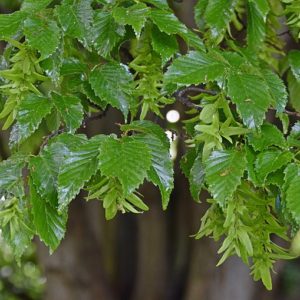
Hornbeam Seed
Carpinus betulus£5.00 inc. VATHornbeam grows to be a medium sized tree with a grey fluted trunk and toothed green leaves that are an outstanding yellow colour in the autumn. The green catkins in spring give rise to the small winged nuts in the autumn. Can be clipped with impunity and so is brilliant as a hedge where Beech is not suitable or would struggle.
Not for forestry purposes
-
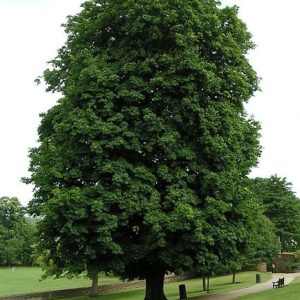
Horse Chestnut Seed
Aesculus hippocastanum£6.00 – £9.00 inc. VATHorse Chestnut is a beautiful, large, deciduous flowering tree. The white flowers with a yellow central blotch form stout pyramids which look highly attractive in their upright position. Insect friendly. The seeds or conkers as they are known are popular with children in Europe for games. They develop in spiky green cases that split open to reveal the beautiful, glossy chestnut brown seed.
-
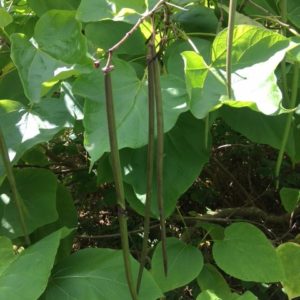
Indian Bean Tree Seed
Catalpa bignonioides£5.00 inc. VATIndian Bean Tree is a medium sized deciduous tree from the eastern USA. Its leaves are up to 20 cm long and it has attractive white flowers with yellow and purple markings, frequented by bees. The fruiting capsules/bean pods are around 30cm long and 4 to 8 mm wide and remain well after the leaves have dropped in autumn. If pollarded every other year, the leaves grow huge, but can then be shattered by heavy rain.
flower pic courtesy of Le. Loup.Gris. Multi-license with GFDL and CC-BY-SA
-
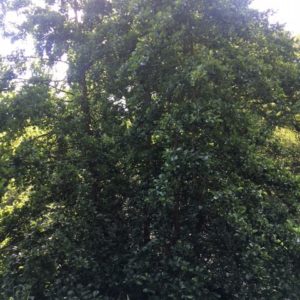
Italian Alder Seed
Alnus cordata£5.00 – £10.00 inc. VATA splendid medium sized, deciduous conical tree, with bright green glistening foliage preceded by yellow catkins that appear in the late winter. Like other Alders, it ‘fixes’ nitrogen from the air, so helping soil fertility. Because of this and the fact that it is tough and hardy, it is often used in the planting and reclamation of old industrial sites. The reddish orange timber is not very durable in air but is long-lasting in water. The blackish cones that hold the seed in autumn are larger than the native Alder cones, and quite decorative.
-
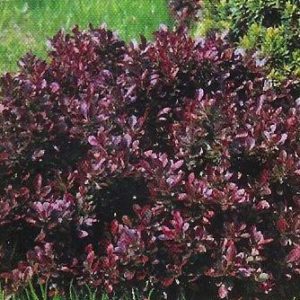
Japanese Barberry Seed (purple leaved)
Berberis thunbergii atropurpureum£5.00 inc. VATA small deciduous, prickly shrub with a rich reddish purple foliage which grows more intense as the year progresses. It produces an outstandingly impressive low hedge.
-
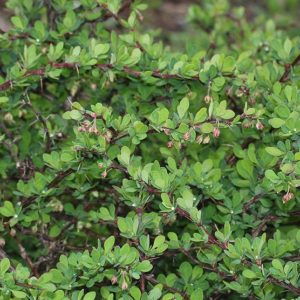
Japanese Berberis Seed
Berberis thunbergii£5.00 inc. VATJapanese Berberis is a small, compact deciduous shrub. It’s autumn colours are outstanding together with its bright red berries. Late in spring it bears pale yellow flowers tinged with red. Insect friendly A useful shrub for creating a low prickly barrier. It can be clipped(carefully!)
-
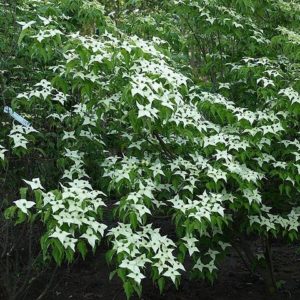
Japanese Dogwood Seed
Cornus kousa£6.00 inc. VATJapanese Dogwood is an elegant, large deciduous shrub or small tree, with abundant, white bract flowers. Moderately slow growing. The leaves turn rich bronze in autumn and are accompanied by the small strawberry like fruits in some years.
-
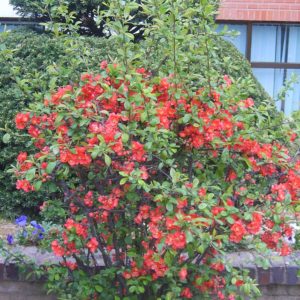
Japanese Flowering Quince Seed
Chaenomeles lagenaria£5.00 inc. VATJapanese Quince is a beautiful and early flowering (February to June) shrub. It is often used for Bonsai as its small bright orange flowers are shown off to marvellous effect. It is very similar to ‘Japonica’ (C. japonica,) but grows larger. In mild winters it retains some leaves. The stems are thorny and straggly but it can be pruned. It is probably best grown trained against a wall. There are a number of named varieties with flowers varying from red to pale pink and white.
-

Japanese Locust Seed
Gleditsia japonicum£6.00 inc. VATJapanese Locust trees have a light canopy with pinnate leaves that emerge late in the spring and fall early making them an ideal canopy tree for a woodland garden. It is notably resistant to honey fungus and is also a nitrogen fixer. The foliage is extremely beautiful but it can have formidable thorns, so pruning is not recommended!.
-
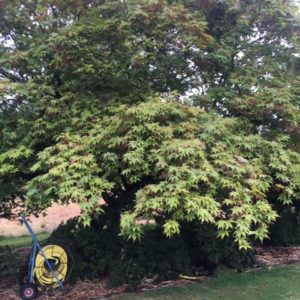
Japanese Maple Seed
Acer palmatum£5.00 – £8.00 inc. VATJapanese Maple is noted for its beautiful autumn colours of red, orange or yellow, but in summer this small deciduous tree or large shrub has bright green lobed, deeply cut leaves. It slowly grows into a graceful tree or large shrub, often multi-stemmed, of open habit. No pruning is necessary and when planted in the right spot, it is relatively carefree.
-
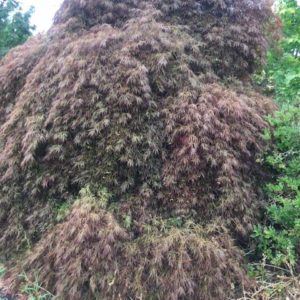
Japanese Maple Seed (purple dissect)
Acer palmatum atrop dissectum£5.00 – £19.50 inc. VATJapanese Maple is a slow growing small tree/shrub with broad arching habit (sometimes looks like a large purple mushroom). Very fine purple-bronze leaves colour to orange in autumn. Excellent in small gardens. Needs no pruning but appreciates mulching with compost in spring.
-
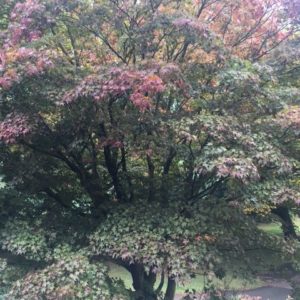
Japanese Maple Seed (purple leaved)
Acer palmatum atropurpureum£5.00 – £10.00 inc. VATPurple Japanese Maple is the most popularly grown of the Japanese Maples. Leaves are a bronze-crimson throughout the summer before turning brilliant red in the autumn. It makes an elegant large deciduous shrub, often multi-stemmed and is quite slow-growing. Because the shade it casts is quite light, under-planting is usually successful, especially with spring bulbs.
-
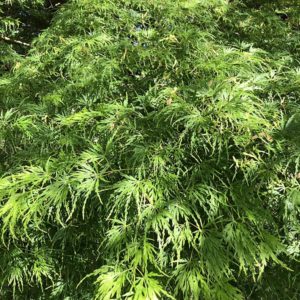
Japanese Maple var. dissectum Seed
Acer palmatum (dissectum)£5.00 – £8.00 inc. VATThe Dissect Japanese Maple is a small deciduous tree or shrub with delicate, ferny 5 or 7 lobed bright green leaves. They turn beautiful vibrant red orange and yellow colour in autumn. It usually produces a mushroom-shaped tree which can be under-planted with bulbs effectively. Planted in semi-shade and in shelter, this is a fine garden plant with long season of interest.
-
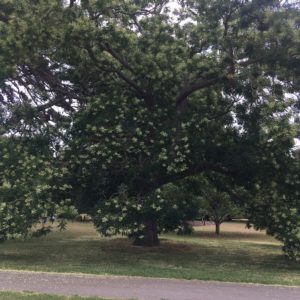
Japanese Pagoda Tree Seed
Sophora japonica£6.50 inc. VATThe Japanese Pagoda Tree is a medium sized round headed deciduous tree with large 30cm leaves made up of 9 to 15 leaflets. It casts only a light shade. On mature trees the creamy pea-like flowers form in large terminal clusters in late summer and autumn. Bee friendly. The long seed pods are persistent.
-

Japanese Quince Seed
Chaenomeles japonica£5.00 inc. VATJapanese Quince, also known as Japonica, is a small, low growing, thorny shrub with bright orange red flowers, appearing very early in spring. These develop into rounded yellow fruits in the autumn. This deciduous shrub has small oval mid green leaves. Pruning can be done in the spring after flowering, or carefully in winter whilst making sure that the flower spurs are not being chopped off. Although Chaenomeles doesn’t flower as well in a shady spot, it makes a useful shrub for a north wall.
-
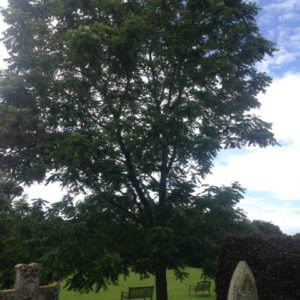
Japanese Walnut Seed
Juglans sieboldiana / ailanthifolia£10.00 – £18.50 inc. VATTh Japanese Walnut grows into an impressive medium sized tree with incredible leaves that may be up to 1m long. It fruits with long pendulous strings of nuts which are known as Heart Nuts, because of the shape. They are sweet and tasty. New growth may be tender to late frosts, so shelter is appreciated.
Pic is a young tree in a Cheshire Churchyard
-
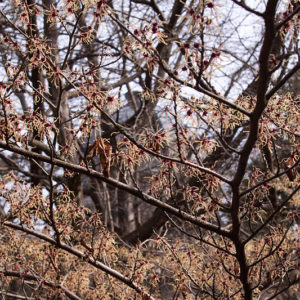
Japanese Witch Hazel Seed
Hamamelis japonica£2.99 – £20.00 inc. VATA yellow winter flowering, deciduous shrub whose leaves turn a yellow-orange colour in late autumn. An ideal plant for use in Bonsai. They are also tolerant of chalky soils.
-
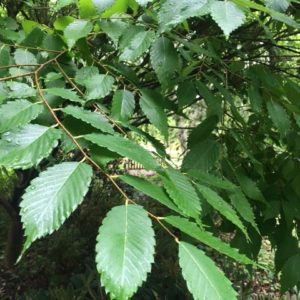
Japanese Zelkova Seed
Zelkova serrata£5.00 – £10.00 inc. VATZelkova is a medium sized graceful wide spreading tree with a round crown and smooth grey bark. The slender oval leaves are up to 12cm long and have narrow pointed teeth. In autumn they turn a bronze red. It is related to Elm (Ulmus) but has proven to be resistant to Dutch Elm disease and so is suggested as a substitute. Pollution tolerant so can be used as a street tree. In Japan it is used as a valuable timber tree.
-
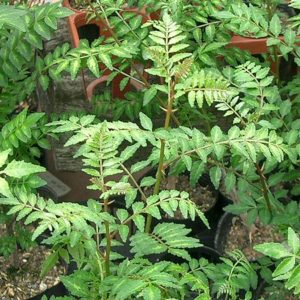
Japanese/Korean Pepper Seed
Zanthoxylum piperitum£2.00 – £3.50 inc. VATZanthoxylum piperitum
Japanese Pepper is a deciduous shrub or small tree. It has pinnate shiny leaves which colour brilliant yellow in autumn. Both the bark and leaves are aromatic and the younger leaves can be used as a flavouring in Korean cuisine. Fairly vicious spines develop on the branch and stem undersides. If both male and female shrubs are present, the green/yellow flowers in April and May will develop into scarlet berries containing black shiny seeds – these are the peppery bits. So it is a good idea to grow several shrubs together.
-
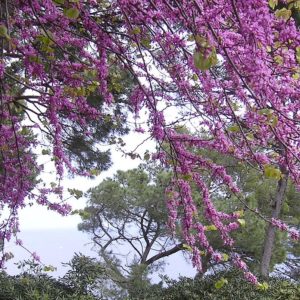
Judas Tree Seed
Cercis siliquastrum£5.00 inc. VATThe Judas tree is a medium sized deciduous tree or large shrub which becomes wreathed in lilac flowers in late spring, sprouting even directly from the main trunk, before the heart- shaped leaves emerge. Purple tinted seed pods develop in autumn.
pic By Kousvet – Own work, CC BY-SA 3.0, via Wikimedia
-
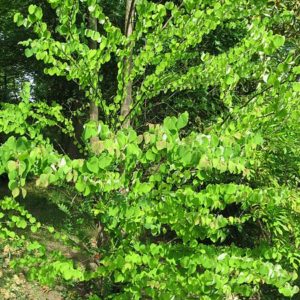
Katsura Seed
Cercidiphyllum japonicum£5.00 – £20.00 inc. VATKatsura is a small deciduous tree with attractive heart shaped leaves, pink when new, fresh green sometimes tinged purple in summer and then bright yellows, oranges, reds and pinks in autumn. Autumn leaves have a caramel/burnt sugar scent and male trees have a stronger scent than female trees. Rarely flowers. Often multi-stemmed.


Sign up to receive great news and offers